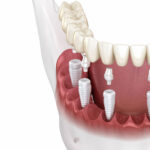Its unfortunate to say, but gum disease is an all too common problem millions of people are affected by. This disease affects the gums and soft tissues of the mouth, compromising the gum tissue, jaw bone, teeth, and can potentially spread to surrounding areas of the mouth and body. In fact, gum disease has been linked to systemic health concerns like heart disease and diabetes! If caught early, gum disease can be treated and the mouth restored to proper health, but if allowed to advance, patients will have to live with gum disease for the rest of their life and require routine periodontal maintenance appointments to maintain health.
Three Stages of Gum Disease
- Gingivitis
- Periodontitis
- Advanced Periodontitis
Symptoms to Look for That May Signify Gum Disease
Bleeding Gums
Bleeding gums are one of the most obvious signs of gum disease. If you find that your gums bleed while brushing or flossing, or even eating, then your gums might be affected. The bleeding is often caused due to inflammation and buildup of plaque around the gum line.
Swollen, Red Gums
Gum tissue should appear a light pinkish color when healthy. But when afflicted by gum disease, the gums will puff up and turn a bright red color. This is also due to the inflammation of the tissue and will often appear side-by-side with bleeding gums.
Constant Bad Breath
If bad breath is a concern even after brushing teeth and using mouth wash, then infection may be present in the gum tissue. Diseased gum tissue is the cause of this bad breath and the only way to truly improve the breath is to seek gum disease treatment to remove the infection.
Receding Gums
If teeth begin to appear longer or show discoloration along the gum line, then you are likely suffering from receding gums. This means that your gums are pulling away from the teeth due to the bacteria, plaque, and tartar buildup on them. Eventually, this compromises the health of the teeth, making them easily damaged and looser.
Toothache
Your teeth should never hurt. If they do, there is likely infection and cavities present. This is caused by the bacteria and plaque that was building up around the teeth, which has broken through the tooth enamel and is compromising the inner tissues of the tooth.
Do You Show Signs of Gum Disease?
If you are experiencing one or more of these gum disease symptoms, call today to schedule an appointment! If you want to learn more about gum disease and the treatment process, contact Dr. Anderson in our Office in Bloomfield Hills, MI at (248) 480-4910 today for a consultation.





